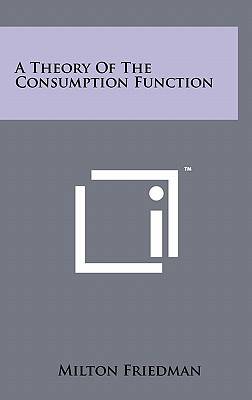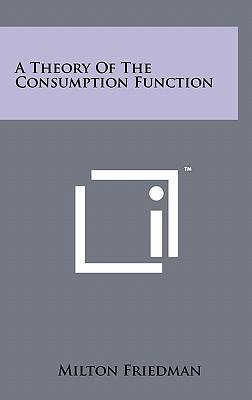
En raison d'une grêve chez bpost, votre commande pourrait être retardée. Vous avez besoin d’un livre rapidement ? Nos magasins vous accueillent à bras ouverts !
- Retrait gratuit dans votre magasin Club
- 7.000.000 titres dans notre catalogue
- Payer en toute sécurité
- Toujours un magasin près de chez vous
En raison de la grêve chez bpost, votre commande pourrait être retardée. Vous avez besoin d’un livre rapidement ? Nos magasins vous accueillent à bras ouverts !
- Retrait gratuit dans votre magasin Club
- 7.000.0000 titres dans notre catalogue
- Payer en toute sécurité
- Toujours un magasin près de chez vous
59,95 €
+ 119 points
Format
Description
A Theory of the Consumption Function is a seminal work of economic theory by Nobel laureate Milton Friedman. In this book, Friedman presents his theory of how individuals and households make decisions about consumption, and how these decisions affect the overall economy. Friedman argues that consumption is determined primarily by individuals' permanent income, rather than their current income. Permanent income is the income that individuals expect to earn over their lifetime, and it is influenced by a variety of factors including education, skills, and family background. Friedman also introduces the concept of the marginal propensity to consume (MPC), which measures the proportion of additional income that is spent on consumption. He argues that the MPC is higher for individuals with lower permanent income, as they are more likely to spend any additional income they receive. Throughout the book, Friedman provides empirical evidence to support his theory, drawing on data from a range of sources including surveys and national income accounts. He also discusses the implications of his theory for government policy, arguing that policies aimed at stimulating consumption are less effective than policies aimed at increasing permanent income. Overall, A Theory of the Consumption Function is a highly influential work that has had a significant impact on economic theory and policy. It remains an important reference for economists and policymakers interested in understanding the determinants of consumption and their implications for the broader economy.This scarce antiquarian book is a facsimile reprint of the old original and may contain some imperfections such as library marks and notations. Because we believe this work is culturally important, we have made it available as part of our commitment for protecting, preserving, and promoting the world's literature in affordable, high quality, modern editions, that are true to their original work.
Spécifications
Parties prenantes
- Auteur(s) :
- Editeur:
Contenu
- Nombre de pages :
- 258
- Langue:
- Anglais
Caractéristiques
- EAN:
- 9781258000998
- Date de parution :
- 02-04-11
- Format:
- Livre relié
- Format numérique:
- Genaaid
- Dimensions :
- 152 mm x 229 mm
- Poids :
- 548 g

Les avis
Nous publions uniquement les avis qui respectent les conditions requises. Consultez nos conditions pour les avis.






